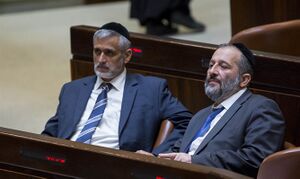Foreign relations of Yisrael: Difference between revisions
old>Finium (Added section on Benaajab) |
Ozycaevias (talk | contribs) m (1 revision imported: Ajax category without templates) |
(No difference)
| |
Revision as of 02:54, 11 January 2019
This article is incomplete because it is pending further input from participants, or it is a work-in-progress by one author. Please comment on this article's talk page to share your input, comments and questions. Note: To contribute to this article, you may need to seek help from the author(s) of this page. |

Introduction
The foreign relations of the Kingdom of Yisrael are the responsibility of His Majesty's Ministry of Foreign Affairs (known alternatively as His Majesty's Foreign Ministry), which is currently headed by Foreign Minister Yitzchok Katz.
Yisrael is a major global economic and financial hub, along with neighboring Fakolana, and is informally known as the "Banker of Scipia". In addition to its economic strength, Yisrael possesses an advanced regional military presence.
The Royal Government in Yerushalayim pursues a strategy of principled stability and shared prosperity by promoting self government and free market capitalism. This has pitted it against the few remaining leftist powers left in the globe, who oppose the Jewish kingdom's anti-communism. Yisrael advocates neoliberal free markets and social conservatism, and these ideological aims are key determinants of its relationships with other world nations.
Special relationships
Arthurista
Tarsas
Allies and close friends
Deweden
Deseret
Abalessa
Eagleland
Nekor
Santheres
Belfras
Friendly
Rhynovia
Vannois
Allamunnic States
Ghant
Rabinovska
Cordial and neutral
Lyncanestria
Nekulturnya
Lihnidos
Intermaria
Benaajab
Benaajab views Yisrael as a fellow theonomist state and an ally in the support of world-wide ecclesiocratic reforms--the primary international objective of the Benaajabi government. Because of the distance between the two nations and because of Yisrael's prominent role in global capitalism, however, there are relatively few interactions between the two states. Benaajab believes that all Abrahamic faiths should be reconciled under a single governing entity, which has lead to misnomers, faux pas, and dismissive language from many Benaajabi politicians.